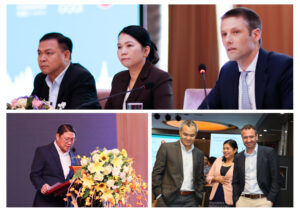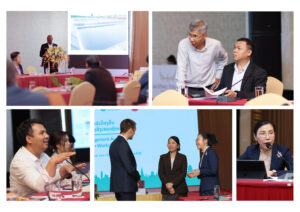Vientiane, Lao PDR, May 17,2024 – The Government of Lao PDR through its Ministry of Natural Resources and Environment (MONRE), in cooperation with Global Green Growth Institute Lao PDR (GGGI), launched the commencement of the National Solid Waste Management Assessment through an Initial Consultation Workshop which was held to officially kick off the assessment. The event was co-chaired by Ms. Phakkavanh Phissamay, Director-General, Department of Planning and Finance, MONRE, Mr. Vilaphon Nuansengsy, Deputy Director-General of Department of Environment, MONRE, and Mr. Rowan Fraser, Country Representative, GGGI Lao PDR.

The National Solid Waste Assessment is part of a broader project, called Advancing ASEAN-Korea Cooperation in Integrated Municipal Solid Waste Management for Environmentally Sustainable Cities, which was launched in December 2023 in Singapore with the aim of mobilizing $100 million, reducing 6 million tons CO2eq, creating 1300 green jobs, and ensuring that 4 million people in ASEAN member states, including in Lao PDR, have access to sustainable solid waste management services. The project is funded by the ASEAN-Korean Cooperation Fund (AKCF) and will be implemented from 2023-2026.
The National Solid Waste Management Assessment will analyze and assess Lao PDR’s waste management practices, challenges, infrastructure, and national regulations. This in turn will help Lao PDR to find potential opportunities for investment and develop recommendations for improving compliances with sustainable waste management regulations and increasing commitment towards environmental protection and public health goals.
The assessment will be carried out during May and July 2024 and involve data collection, stakeholder engagement and best practices analysis. Current basic waste management services and existing waste management practices and regulations will be studied and an inventory of disposal facilities, at central and local levels, will be developed. The assessment will provide evidence for updating existing national laws in Lao PDR to align with ASEAN’s regional strategies and guidelines. This assessment is also expected to provide a waste management baseline and background information for the preparation of Lao PDR’s 10th National Social Economic Development Plan (NSEDP), which will begin soon. Furthermore, the assessment is expected to identify investment opportunities and entry points for transforming the waste sector with the target of mobilizing at least $25 million in waste management investments in Lao PDR.
Fifty participants attended the workshop from the government, development partners, private sector, and academic institutions. It provided a solid partnership and networking platform for the various entities contributing to sustainable solid waste management efforts in Lao PDR and ASEAN.

“This assessment will help to develop recommendations for improving waste management service provision by the Urban Development and Administration Authorities (UDDAs), compliance with the regulations as well as contribute to environmental protection and enhancing public health through showcasing current and best practices which the country should be adopting and investing in.” Stated by Ms. Pakkavanh Phissamay.
Mr. Vilaphon Nuansengsy highlighted that sustainable solid waste management is a significant challenge across Lao nation. “Practices such as littering, open dumping, rubbish burning, and depositing waste in drainages and open streets are leading to environmental pollution” Mr. Nuansengsy said. He also stressed the importance of a study to comprehensively grasp the scale of the challenge, identify key stakeholders, evaluate infrastructure conditions, and explore opportunities for investment aimed at transforming waste into a valuable resource.
GGGI is committed to support collaborative efforts to improve solid waste management in Lao PDR and will work to ensure that essential data, ideas, and insights from stakeholders integrated to the development of the National Solid Waste Management Strategy and the Environment and Natural Resources chapter of the National Social Economic Development Plan (NSEDP).
About the Advancing ASEAN-Korean Cooperation in Integrated Municipal Solid Waste Management for Environmentally Sustainable Cities Program
The program, endorsed by the ASEAN Working Group on Environmentally Sustainable Cities and ASEAN Senior Officials on Environment is funded by the ASEAN-ROK Cooperation Fund. It is implemented by a consortium of Global Green Growth Institute (GGGI) (Lead), National Institute of Green Technology (NIGT), Korea Environment Corporation (K-Eco), and Nanyang Technological University (NTU). Through the program, GGGI and ASEAN Secretariat will work towards developing a regional strategy for integrated municipal waste management and provide roadmaps for the countries to adopt. The program will work towards formulating a strengthened and coherent regional framework and accelerate investments of about USD 100 Million in bankable waste management projects, in the ASEAN region. It will also establish multi-stakeholder knowledge sharing among ASEAN Member States and strengthen and expand knowledge sharing and collaboration between Korea and ASEAN Member States.
About ASEAN-KOREA Cooperation Fund
ASEAN-KOREA Cooperation Fund is a fund that was established in 1990 to strengthen Korea-ASEAN bilateral relations and promote projects agreed upon by both sides in areas such as development cooperation, human resources, and cultural and academic exchanges.